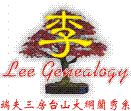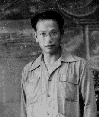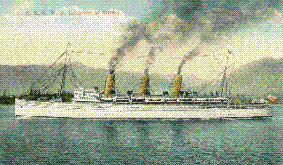

 Dad was born in 1899, the only child of Yin Chap (è³¢ç¡Z¡Z) and Li Shi (¡Z¡Z©æ¡Z¡Z太夫亡Z). Because of his father's poor health, Dad, in 1916 at the age of 17, left the village (Tai Gang Tsun 大綱¡Z¡Z¡Z) in Taishan, Guangdong, China boarded the Empress of Russia for Canada. According to his head tax paper he arrived in Victoria on September 23, 1916. His Uncle Yin Jic (è³¢ç¡Z¡Z), his father's elder brother, paid the $500 Head Tax and he joined his uncles in Montreal and worked in their hand laundry business.
Dad was born in 1899, the only child of Yin Chap (è³¢ç¡Z¡Z) and Li Shi (¡Z¡Z©æ¡Z¡Z太夫亡Z). Because of his father's poor health, Dad, in 1916 at the age of 17, left the village (Tai Gang Tsun 大綱¡Z¡Z¡Z) in Taishan, Guangdong, China boarded the Empress of Russia for Canada. According to his head tax paper he arrived in Victoria on September 23, 1916. His Uncle Yin Jic (è³¢ç¡Z¡Z), his father's elder brother, paid the $500 Head Tax and he joined his uncles in Montreal and worked in their hand laundry business.
The Chinese, as a rule, aren't big on details when giving account of events. A major historical event may be recorded simply by cause and effect. Anybody reading older Chinese writings on historical events can't help but observe this briefness. So Dad was no exception when he talked about himself.
 When he talked about his journey to Canada, the wording was something in the nature of "the ship docked, Uncle came aboard to meet me, he paid the Head Tax and I stayed." Nothing was said about the ship, the living conditions, the living quarters, the food or the fellow passengers. The probing of his feelings and fears in leaving home and traveling to a far and foreign land at such a young age never came up. The over-crowded condition in Southern China made going abroad to work and support the family an accepted part of life. This, personal sacrifices for the family, is in-line with traditional Chinese culture. Thinking back, there was a feeling that conditions in the new home couldn't be worse than those in China.
When he talked about his journey to Canada, the wording was something in the nature of "the ship docked, Uncle came aboard to meet me, he paid the Head Tax and I stayed." Nothing was said about the ship, the living conditions, the living quarters, the food or the fellow passengers. The probing of his feelings and fears in leaving home and traveling to a far and foreign land at such a young age never came up. The over-crowded condition in Southern China made going abroad to work and support the family an accepted part of life. This, personal sacrifices for the family, is in-line with traditional Chinese culture. Thinking back, there was a feeling that conditions in the new home couldn't be worse than those in China.
Upon his arrival in Canada, Dad went to school for about two months before starting to work in his uncle's laundry, The Charlie Li, on St. Denis Street. There he would stayed, except for the four trips back to China, until 1952 when he decided to enter the restaurant business. The hours at the laundry were long - eighteen-hour days were the norm. I remember he talked about falling asleep on his feet while ironing. He showed me one of the irons. The were heavy. It was more of an anchor than iron.
Another part of Dad's job was collecting and delivering laundry. He showed me his black lunch box which had a thermos bottle inside and the bag he used to hold the laundry. It was a huge looking monster, almost as tall as him. I could imagine the difficulties he must have had in hauling it through his route. It must be really brutal during the months with the heavy Montr嶧l snow-falls. He said there were occasions when the bus drivers wouldn't let him on because of the enormous laundry bag while other times he would get a free ride because of it.
In 1921 Dad went back to China and got married to Jiu Thue Loon (趡Z翡Z鸡Z). It was, as was the custom of the time, an arranged marriage. They didn't enjoy too much time together as Dad returned to Canada shortly after.
The next trip home for Dad came in 1927. Their eldest child, Lin Feng (¡Z¡Z³é³³), was born on July 11, 1928. Not long after my sister's birth, Dad returned to Canada and to the laundry, just in time for the Great Depression.
He didn't say too much about the Depression. I only remember two of his comments:
Despite the Depression, Dad managed to save enough for another trip back to China in the late 30's. During this trip two major events took place:
Shortly after, Dad returned to Canada. Apparently not a moment too soon, as the war on the Pacific escalated and shipping lanes were closed until the end of World War II. A large number of people were caught in this situation and their Canadian visas expired.
After the war, Dad embarked on a trip to China again. While away, his eldest daughter, Lin Feng, grew up and married. Dad missed her wedding but was on hand when on November 15, 1948, she gave birth to a baby girl, Yuk Ling (麥ç¡Z¡Z¡Z¡Z¡Z).
While in China, Dad purchased some farm land because as he was approaching 50 and retirement was on his mind. He planned to return to Canada for a few more years then retire to China and farm. The hardship Mom and the family suffered when the shipping lanes were closed during the war was another major factor.
Their first and only son, Kevin, was born on February 27, 1949. Upon returning to Canada, Dad continued with the laundry trade until 1952 when he joined a group buy and operate the Jade Garden Cafe in Montreal's Chinatown. It was a major decision as he ventured into a brand new line of business at the twilight of his career. Friends and relatives advised him not to stay put and avoid risk at his age. Whether he had foreseen the hand laundry business as a sunset trade and the upcoming popularity of Chinese restaurants is something we don't know. All we know is he made the switch.
Dad's retirement plan went down the drain with the Communist's take over of China. The farm land he acquired was confiscated during the Land Reform (¡Z¡Z¡Z¡Z¡Z¡Z). Actually, we were fortunate that we didn't have enough land to be classified as landlords (大å¡Z°ä¸»). Another factor was that both of my parents were the mild mannered type so they didn't have any enemy who may wanted revenge by coming forward with any charges and accusations.
So, Dad decided that the best course of action was for him to become a Canadian citizen and have the family join him in Canada. However, he did wanted his son to started school and learned some Chinese before coming to Canada. Even after arriving in Canada he would buy from Hong Kong the more traditional text books such as The Thousand Words Poem (¡Z¡Z¡Zå¡Z¡Z¡Z¡Z)
It was at this point in time Dad and his cousin, Lee Hay Yim (¡Z¡Z¡Z帡Z¡Z¡Z¡Z), Da Gong's son, in the time honoured Chinese tradition agreed each will arranged to bring over a nephew from China. This arrangement was to ensure my grandfather and each of his siblings will have a descendant in Canada and take care of their own family. When filing their naturalization papers both Dad and his cousin reported an extra son with the intend of bring the nephews to Canada. The arrangement was for Dad to bring San Gong's (両Z¡Z¡Z¡Z) grandson, Lee Kwan Hym (¡Z¡Z¡Z群欽) over. My uncle was to bring his cousin Lee Yi Wing's (¡Z¡Z¡Z亦榮) eldest son Lee Kwan Fu, (¡Z¡Z¡Z群å¡Z¡Z) over. The plan fell apart, however, as my uncle sold the paper intended for Lee Kwan Fu to a distant cousin, Lee Hay Nuan (¡Z¡Z¡Z帡Z¡Z¡Z¡Z) who used it to bring his son, Lee Lum Yi (¡Z¡Z¡Z¡Z¡Z«ç¡Z¡Z), to Canada.
However, all was not lost. Lee Kwan Hym's immigration process went smoothly. During the interview he gave all the right answers, so to speak. He left Hong Kong for Canada in either late 1956 or early 1957 because at the time there was a host of cousins going through the immigration process resulting in many trips to the airport.
On the evening of December 20, 1957, Dad and his cousin, Hay Yim or On Shu (审Z¡Z¡Z¡Z), were on the platform of Windsor Station waiting for the arrival of the train with members of his family whom he last saw more than seven years ago.
Working conditions in the restaurants were poor. The standard was 6.5 days a week and 12 hours a day with an annual 2 weeks vacation. Dad worked the day shift which was from 10 am to 10 pm. I only get to see him early in the morning and late at night. Tuesday was the day to forward to because it was Dad's day off, half a day actually. He still had to go in and worked till 4 in the afternoon. In the summer we would take advantage of the long daylight and visited the park. We frequented Lafontain Park which is close by the laundry shop on St. Denis. On occasions we visited relatives and friends. After supper Dad would tell stories of famous people, experiences of the older overseas Chinese, or passages from the old Chinese writings. Unfortunately I manage to retain some but forgotten most.
Every day before going to work Dad would drop by to see his Third Uncle (両Z¡Z¡Z¡Z), Yin Gang (賢簡), who was a long term tenant in a Chinatown hotel, the Hangzhou Hotel (¡Z¡Zæ´²¡Z¡Z¡Z餡Z). I remember the visits to his room. I think it is room 7, a corner unit on the second floor. I was most intrigued by the grandfather clock standing in the corner of the room.
Dad would generally arrive home from work at about 10:30 or so. If it rained unexpected we would meet him at the bus stop with his umbrella. He liked to relax with some peanut and herbalized gin, about 3/4 of a shot-glass. He wasn't much of a drinker because his face and neck would turned beet red.